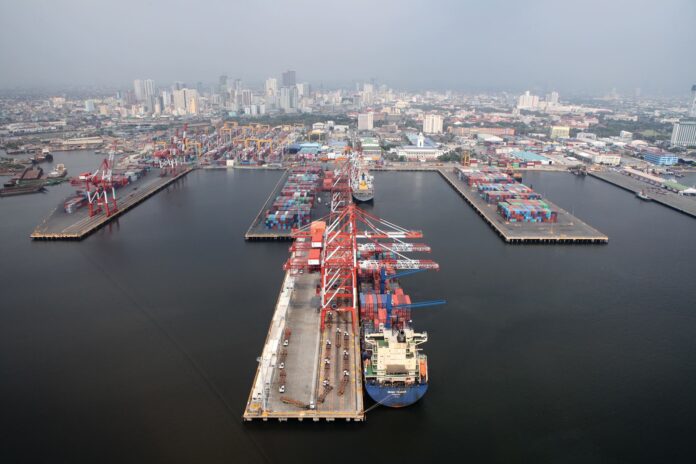-
Port operators Asian Terminals Inc. (ATI) and International Container Terminal Services, Inc. (ICTSI) are proposing higher cargo-handling tariffs at the Manila international terminals
-
ATI is seeking an 11% upward adjustment for Manila South Harbor
-
ICTSI is asking for a 10% increase, excluding transshipment and new tariff items in 2021, for Manila International Container Terminal
-
Majority of stakeholders at the virtual public hearing opposed the petitions
-
Stakeholders have until April 16 to submit their position papers
Port operators Asian Terminals Inc. (ATI) and International Container Terminal Services, Inc. (ICTSI) are proposing an increase in cargo-handling tariffs for Manila international terminals.
In a virtual public hearing on April 8, ATI sought an 11% upward adjustment to Manila South Harbor’s cargo-handling tariff while ICTSI asked for a 10% increase in cargo-handling tariff, excluding transshipment and new tariff items in 2021, for Manila International Container Terminal (MICT).
The petitions do not include empty container handling, rates for which took effect last January.
READ: PPA sets fees for handling foreign empties at Manila and Batangas ports
The terminal operators’ petitions are pursuant to Philippine Ports Authority (PPA) Administrative Order (AO) No. 02-2018, which prescribes a new standard and uniform formula and procedures for cargo-handling tariff adjustment.
Under AO 02-2018, which took effect in March 2018, the cargo-handling/terminal operator may apply for a cargo-handling tariff adjustment if the consumer price index (CPI) has increased by at least 5% within a three-year period.
Both ATI and ICTSI said CPI had increased from 2018 to 2020.
MICT management services and government affairs director Voltaire Wycoco during the hearing said CPI for all items in the Philippines grew 10.58% in 2020 from 2017.
Both terminal operators said they are eligible for tariff adjustment after having complied with requirements of AO 02-2018. They cited investments made since 2018 to improve infrastructure and operations, as well as ongoing and future projects for the next three years.
The last cargo-handling tariff rate adjustment for the two ports was in 2018, when PPA granted a 7% rate increase.
ATI assistant vice president for business development Edward Ian Baking said during the public hearing that for Manila South Harbor, the proposal would mean:
- Stevedoring for a 20-foot laden container will be US$116.62 from the current $105.46
- Arrastre for a 20-footer import container will be P4,762.81 from the current P4,307
According to Wycoco’s presentation, for MICT:
- Vessel tariff rate for a full 20-footer container will be $116.614 from the current %105.457
- Cargo tariff for an import 20-footer will be P4,762.68 from the current P4,307
Both terminal operators said their petitions would only have a minimal impact on the cost of goods and commodities.
A quick survey of stakeholders who participated during the virtual public hearing, however, showed strong opposition.
Supply Chain Management Association of the Philippines’ Corazon Curay said that while the computed impact on costs may be minimal, “any cost increase is a cost increase” and these costs would be passed on to consumers.
She added that while they appreciated the investments made by the port operators, recent tariff rates such as the new empty container handling charge and storage of out-of-gauge cargoes, as well as the cranage rates at Manila North Harbor, are adding up and have had an impact on the cost of doing business in the Philippines.
READ: Storage rates for OOG containers at Manila, Batangas ports in effect from Jan 1
Philippine Ship Agents Association president Joselito Ilagan conveyed to PPA that in many studies made, including those of the World Bank and local regulators, “the cost of doing business in the Philippines is much, much higher compared to our neighboring countries.”
He said another rate increase would “aggravate our competitive position” with neighboring countries.
Mariel Metzker of the Association of International Shipping Lines (AISL) said they also do not welcome the petitions as this would mean additional cost.
Metzker cited recent rates implemented for empty container handling, which she noted would, based on an AISL position paper submitted last year, entail an additional cost of P5 billion this year for shipping lines.
While shipping lines are experiencing “very good rates,” these are “already going down”, she noted, adding that lines are facing higher charter and bunker costs.
Stakeholders have five working days from the conduct of the public hearing or until April 16 to submit their position papers for evaluation by the technical working group. – Roumina Pablo





